Social Contribution Activities
- Basic Approach
- Basic Policy
- Key Focus Areas
- Target Setting
- Promotion System
- Procedure for Activities
- Major Social Contribution Activities
- Employees' Social
Contribution Activities - Activity Results Data
Daifuku Group Policy for Social Contribution Activities
Basic Approach
The Daifuku Group believes that, through labor saving and automation, our business activities can help solve social issues such as labor shortages and others. In addition, we will proactively interact with local communities as a corporation, and we will not only contribute to society through our business, but we will also contribute to the sustainable development of society by sincerely engaging in social contribution activities* that extend beyond the scope of our business. Furthermore, based on this Policy for Social Contribution Activities, we will promote social contribution activities that utilize the resources of the Daifuku Group and have a high synergistic effect with our business activities. Engaging in such activities is a vital foundation for the development of the Daifuku Group’s business and the achievement of the targets in our long-term vision, Driving Innovative Impact 2030.
Basic Policy
We have established the following points in order to conduct social contribution activities that sincerely respond to the demands and expectations of society.
- Key focus areas for activities
- We have established solving social issues, the natural environment, coexisting with local communities, and development of next-generation human resources as key focus areas, and we will carry out specific activities focused on these topics.
- Key features of activities
-
-
Employee participation
We value coexistence with local communities and contributions to society through the voluntary participation of our employees in social contribution activities, and we fully support these activities. -
Leveraging the Group’s strengths
We will actively utilize the Group’s resources, including products, services, human resources, technologies, and know-how, as appropriate in these activities. -
Joint development with stakeholders
Through communication with our stakeholders, we will strive to promote and improve our social contribution activities as well as to disclose their content.
-
Employee participation
Established: June 1, 2025
- *This Policy encompasses only company-sanctioned social contribution activities. Activities such as those that may be political in nature and/or deemed divisive or offensive are not covered by this Policy.
Key Focus Areas
- Solving social issues
- Solving social issues by leveraging Daifuku's business activities and technological capabilities
- The natural environment
- Environmental conservation activities for a sustainable society
- Coexisting with local communities
- Community contribution activities for building ties with local communities
- Development of next-generation human resources
- Developing and securing next-generation human resources necessary for Daifuku's continuous value creation
Focus Area Establishment Background and Benefits to Business
| Solving social issues |
|
|---|---|
|
|
| The natural environment |
|
|
|
| Coexisting with local communities |
|
|
|
| Development of next-generation human resources |
|
|
Target Setting
The Group has set fulfillment of stakeholder communication as a priority topic in our four-year business plan for 2027 and enhancement of communication with stakeholders as and one of its KPIs. One of our targets for this priority topic is to actively participate in social contribution activities on a global scale.
Promotion System
The Group has set priority topics and KPIs related to social contribution activities in our four-year business plan, and their progress is managed by the Sustainability Promotion Committee, which is chaired by the President and CEO.
Procedure for Activities
Based on the Daifuku Group Policy for Social Contribution Activities, we implement a PDCA cycle to promote effective and efficient activities.
PDCA cycle
Please enlarge the screen to view

Major Social Contribution Activities
Solving social issues
Development and sales of automated warehouses for specialized environments
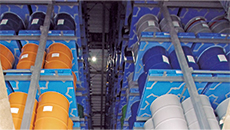
We develop and sell automated warehouses that transport and store items in high-rise racks without manual labor. These products are capable of handling items in a wide range of shapes and sizes, and they can also be installed in specialized environments, including frozen storage, high-temperature areas, explosion-proof zones, and oil-resistant settings. In addition to addressing labor shortages in logistics and production sites, the installation of our products—particularly in environments such as freezer warehouses below -20°C and hazardous materials storage—also helps reduce manual work in harsh and dangerous conditions, leading to improved productivity and better working environments.
Development of an internal washing system for waste collection vehicles
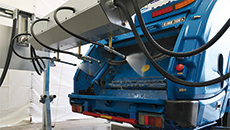
Daifuku developed the Shower Hopper, Japan’s first automated internal washing system for waste collection vehicles. The interiors of waste collection vehicles are typically cleaned once daily after use; this work was previously performed manually, but labor shortages and work style reforms have brought about a growing need for automation. In addition, this type of manual work has both safety and hygiene issues. Daifuku is therefore utilizing the cleaning and automation technologies we have cultivated through car wash machine development, and by automating the cleaning of areas such as the inlet port and the rear loading apparatus, we are contributing to workload reduction, improved cleaning capabilities, and reduced water consumption.
Surveys and collection of floating macro-debris including plastic waste
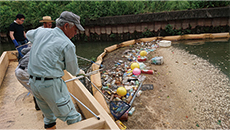
We conduct surveys and collection of floating macro-debris, including plastic waste. Plastic waste is a major issue in the environmental conservation of Shiga Prefecture, where Daifuku's main factory is located. We will invest in solutions to local community issues, reduce the burden of labor-intensive river debris collection work, accelerate surveys and collection in accordance with Ministry of the Environment guidelines, and aim to realize effective solutions and transition to sustainable operations.
The natural environment
Nature conservation around Lake Biwa
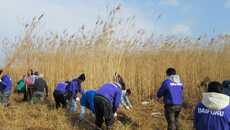
Each year, employees from Shiga Works take part in a community activity together with local residents, companies, and environmental conservation groups to clip reeds surrounding Lake Biwa. It is essential to trim the overgrown reeds every winter to protect the reed beds, which play an important role in preserving the ecosystem and water health of Lake Biwa. The reed clippings are then used as raw materials for paper products.
Ecosystem conservation activities at Shiga Works
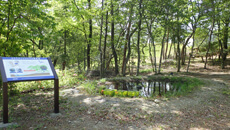
Shiga Works, the Group's main plant, covers a vast area of over 1.2 million square meters. More than 1,000 native species inhabit the premises, and among them, over 70 endangered and rare species having been identified. To protect this rich natural environment, we are working on the Yui Project, a biodiversity conservation initiative that connects people with nature, water with greenery, and people with people. As part of the Yui Project, we have established Yui no Mori, an area comprised of conservation ponds, learning centers, and more. The area is used to protect endangered and rare species identified within the Shiga Works premises and to provide opportunities for environmental learning and interaction within and outside the company. Activities through this project are not limited to environmental conservation within the premises, but also contribute to the conservation of ecosystems in surrounding areas through the formation of a natural environment network.
Coexisting with local communities
Regional Revitalization Team Project
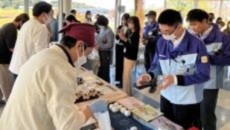
Beginning in fiscal 2019, Shiga Works launched the Regional Revitalization Team Project to promote interaction between employees and the local community. In fiscal 2024, donation boxes made by employees were installed in each cafeteria, donations were made to a social welfare organization in Hino Town, Shiga Prefecture, and sales and tasting events by local vendors were held in conjunction with walking events during lunch breaks at Shiga Works.
Community cleanup activities
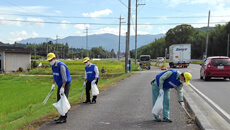
Shakunage-gunraku, also known as Rhododendron Gorge, is a nationally designated Natural Monument located near Shiga Works. Since 2005, Daifuku has participated cleanup events organized by the Hino Tourism Association in April before peak season. In addition, we have been participating in the Omi Eco-Foster System promoted by Shiga Prefecture since 2001, cleaning up national roads around Shiga Works. In fiscal 2024, events were held 12 times with a total of 111 participants.
The Tokyo Head Office also participates in annual volunteer raking of fallen leaves at the Kyu Shiba Rikyu Gardens, which is located nearby the office building, together with other neighboring corporations as part of our annual community contribution activities.
Provision of a temporary evacuation shelter
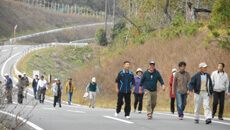
Daifuku has established an agreement with Hino Town, Shiga Prefecture, to accommodate local residents in the event of evacuation resulting from a disaster. This agreement was broached after local residents requested that we provide Shiga Works as an evacuation site in the event of an emergency. After conducting a simulation of receiving evacuees and confirming the contents of the agreement with other companies near Shiga Works, we decided to enter into the agreement in the interest of social contribution.
Local procurement and local hiring
We believe that one of the activities that contributes to local economies is to procure in the vicinity of our operating areas. This can include parts, food, or other necessities. We are dedicated to the growth of communities through our procurement for Shiga Works and other regions. Also, we actively seek out talent in the vicinity of our sites and provide them employment opportunities. We will continue to contribute to the vitalization and advancement of regional economies through local procurement and employment.
Development of next-generation human resources
Visiting lectures to nearby elementary schools
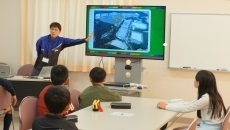
In fiscal 2023, we gave a visiting lecture at an elementary school in Shiga Prefecture, where one of our facilities is located. This lecture was part of a project launched in 2023 by Shiga Prefecture and in cooperation with corporations and other organizations to create opportunities for diverse experiences for children. As a model project, we introduced local children to our biodiversity conservation activities, including the dragonflies that inhabit the Shiga Works premises.
Educational field trips to Hini Arata Kan
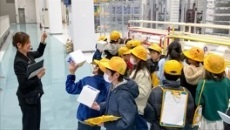
We have been accepting educational field trips at Hini Arata Kan, our demo center within Shiga Works, since fiscal 2014. We have designed a tour program for students in 5th grade of elementary school or above that follows the content of government curriculum guidelines. In this program, the students deepen their understanding of factory production and information society through the world of material handling. In addition to viewing the demo systems, the students can also enjoy learning through a variety of activities, such as watching videos made specifically for elementary school students, comparing the speeds of the demo systems, and more. In fiscal 2024, around 450 students from six elementary schools participated in these field trips.
Etiquette training
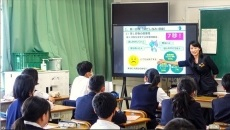
Since fiscal 2015, we have been holding etiquette training led by Hini Arata Kan staff members. As advance preparation for the workplace experience training implemented at public junior high schools in Shiga Prefecture (Junior High School Student Challenge Week), students receive training with demonstrations in business etiquette such as how to greet politely and answer the phone. In fiscal 2024, 1,119 students from eight junior high schools (34 classes) participated in these training sessions. This training is also offered for local university students, teaching staff, and administrative staff.
Lectures on material handling for university students
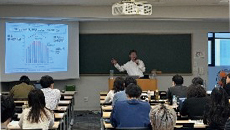
Lectures are given to university students as an opportunity to familiarize them with Daifuku's material handling business. In the lectures, we explain what material handling is as well as its history. We are continuing to hold these lectures in an effort to spark interest and deepen understanding through case studies of installed solutions, ultimately helping to cultivate human resources for the future material handling industry. In fiscal 2024, a total of seven lectures were given at six universities.
Participation in Table for Two
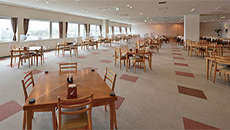
Since 2017, we have been participating in a food-based social contribution program operated by the specified non-profit organization Table for Two International. We donate 20 yen for every lunch served at the restaurant in Hini Arata Kan, which is equivalent to one school meal for children in developing countries. In fiscal 2024, we donated a total of 67,280 yen.
Sponsorship of Kokoro no Gekijo invitational performances for children
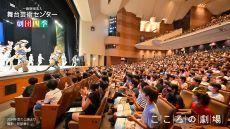
Daifuku sponsors Kokoro no Gekijo (Theater for the Heart) performances, which are organized by the Butaigeijutsu (Performing Arts) Center and the Shiki Theatre Company, in Osaka, Shiga, and Hyogo prefectures. Kokoro no Gekijo is an initiative that invites children from all over Japan to theaters free of charge. The project aims to speak to children's hearts through stage performances about important lessons in life, such as the preciousness of life itself, caring for others, and the joy of mutual trust.
Employees' Social Contribution Activities
The Daifuku Group actively supports employees' participation in social contribution activities in accordance with our Policy for Social Contribution Activities. Through social contribution activities, we are fostering a culture in which each employee is conscious of various social issues and works to voluntarily and proactively address them.
Progress
| Specific activities with employee participation | Nature conservation around Lake Biwa (the natural environment) |
| Community cleanup activities (coexisting with local communities) |
Related systems
- Volunteer leave system
- The Daifuku Group has established a volunteer leave system to encourage employees to participate in volunteer activities.
- Daifuku Sustainability Action Program
- In fiscal 2012, we launched a program to award points to employees for participating in their environmental and volunteer activities. Under this program, employees can exchange the points they earn for environmentally friendly products and other rewards, and Daifuku donates a proportionate amount to external organizations. In fiscal 2024, we donated 3.31 million yen to external environmental organizations.
FY2024 Activity Results Data
Expenditures for social contribution activities
| Item | Scope | Unit | FY2024 |
|---|---|---|---|
| Expenditures for social contribution activities (including donations) |
Daifuku Co., Ltd. | Yen | 25,141,125 |
| Of which, donations to non-profit organizations | Daifuku Co., Ltd. | Yen | 3,387,192 |
Investment by focus area
| Key focus areas | Investment details | Scope | Unit | FY2024 |
|---|---|---|---|---|
| The natural environment | Donations through the Daifuku Sustainability Action Program | Daifuku Co., Ltd. | Yen | 1,790,000 |
| Biodiversity conservation activity costs | Daifuku Co., Ltd. | Yen | 4,100,162 | |
| Coexisting with local communities | Donations through the Daifuku Sustainability Action Program | Daifuku Co., Ltd. | Yen | 1,500,000 |
| Donations and activity costs related to revitalization of local communities, such as the Regional Revitalization Team Project | Daifuku Co., Ltd. | Yen | 2,963,582 | |
| Cleaning and greening activities around Daifuku sites | Daifuku Co., Ltd. | Yen | 2,247,000 | |
| Development of next-generation human resources | Reception of university, vocational college, junior high school, and elementary school members at Hini Arata Kan | Daifuku Co., Ltd. | Yen | 534,240 |
| Participation in Table for Two | Daifuku Co., Ltd. | Yen | 67,280 | |
| Total | Yen | 13,202,264 | ||
